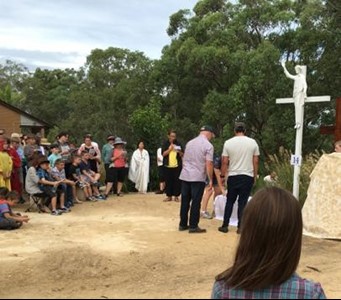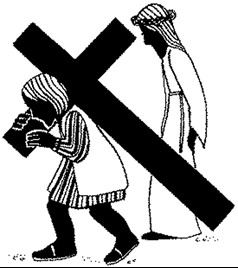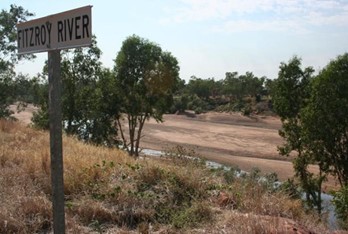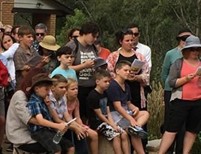About thirty young people gathered for the annual Be Grow Show Retreat. The overarching theme for each of these retreats is to be in your faith, grow in your faith and to show your faith. This year they contemplated the Jubilee Year of Mercy with Fr Richard Shortall sj, our Missionary of Mercy, being present with them for the weekend, sharing Pope Francis’ desire for mercy, for all to announce the mercy of God as the beating heart of who we are as church.
 We are blessed to have, for our young people, some mentors who supported them over the weekend with input sessions and also provided food and spiritual nourishment. As well as this, a number of the young adults arranged the regular Praise and Worship night that provided music, prayer, quiet time and adoration over a two-hour period. The weekend was held at Kilaben Bay and so the young people participated in the parish Palm Sunday Mass. Mass at St Joseph’s Toronto is always wonderful and the Vigil Mass provided a good experience of Eucharist.
We are blessed to have, for our young people, some mentors who supported them over the weekend with input sessions and also provided food and spiritual nourishment. As well as this, a number of the young adults arranged the regular Praise and Worship night that provided music, prayer, quiet time and adoration over a two-hour period. The weekend was held at Kilaben Bay and so the young people participated in the parish Palm Sunday Mass. Mass at St Joseph’s Toronto is always wonderful and the Vigil Mass provided a good experience of Eucharist.
As I popped in and out of this retreat over the weekend, there was a real sense of peace and joy. Bishop Bill also joined them for some of their sessions. The retreat finished with the Way of the Cross which they co-ordinated, with several of our primary and high schools providing the ‘tableau’ for each station. Once again the bush setting is just so Australian and beautiful. I love the look on the faces of the young children who come along. They are captivated by the story and the accompanying movement. There is silence from all, for the fourteen stations and one is able to feel the reflections of the life of Jesus and the lives of those gathered. We take this time to re-tell our story to the young, and to those who are ageing, and to all ages in between. The following reflection was read at the seventh station – Jesus is helped by the Cyrenean:
 The Church which “goes forth” is a community of missionary disciples who take the first step, who are involved and supportive, who bear fruit and rejoice. An evangelizing community knows that the Lord has taken the initiative, he has loved us first, and therefore we can move forward, boldly take the initiative, go out to others, seek those who have fallen away, stand at the crossroads and welcome the outcast. Such a community has an endless desire to show mercy, the fruit of its own experience of the power of the Father’s infinite mercy. Let us try a little harder to take the first step and to become involved. Jesus washed the feet of his disciples. The Lord gets involved and he involves his own, as he kneels to wash their feet. He tells his disciples: “You will be blessed if you do this” (Jn 13:17). An evangelizing community gets involved by word and deed in people’s daily lives; it bridges distances, it is willing to abase itself if necessary, and it embraces human life, touching the suffering flesh of Christ in others. Evangelizers thus take on the “smell of the sheep” and the sheep are willing to hear their voice. (EG 24)
The Church which “goes forth” is a community of missionary disciples who take the first step, who are involved and supportive, who bear fruit and rejoice. An evangelizing community knows that the Lord has taken the initiative, he has loved us first, and therefore we can move forward, boldly take the initiative, go out to others, seek those who have fallen away, stand at the crossroads and welcome the outcast. Such a community has an endless desire to show mercy, the fruit of its own experience of the power of the Father’s infinite mercy. Let us try a little harder to take the first step and to become involved. Jesus washed the feet of his disciples. The Lord gets involved and he involves his own, as he kneels to wash their feet. He tells his disciples: “You will be blessed if you do this” (Jn 13:17). An evangelizing community gets involved by word and deed in people’s daily lives; it bridges distances, it is willing to abase itself if necessary, and it embraces human life, touching the suffering flesh of Christ in others. Evangelizers thus take on the “smell of the sheep” and the sheep are willing to hear their voice. (EG 24)
Many of the passages of our Way of the Cross for this year resonated with me but this one invites us to serve as missionary disciples. This requires that we know our story and seek to share it.
 On Wednesday night I saw the movie, Putuparri and the Rainmakers. This movie told the story of Tom “Putuparri” Lawford, an Aboriginal man who explores the twenty transformative years of his life as he navigates the deep chasm between his Western upbringing and his determination to keep his traditional culture alive. His ancestors were from the Great Sandy Desert, but mining interests took them off their land and most of the elders were moved to Fitzroy Crossing. Over the twenty years, Putuparri goes back to country with his uncle and other elders and is told and shown his tribal story. He eventually is healed of his wayward ways and his connection to the land, its story, its significance and that of his people, deepens. He owns the importance of being connected to his past heritage, with its stories, dances and symbols, his culture. A powerful aspect of the movie for me was the fear in the people of losing the spirit of the land that had been handed onto them, by not remaining connected to it. They are conscious that, by not returning to the land and carrying out these important rituals, the spirit will leave and be lost forever.
On Wednesday night I saw the movie, Putuparri and the Rainmakers. This movie told the story of Tom “Putuparri” Lawford, an Aboriginal man who explores the twenty transformative years of his life as he navigates the deep chasm between his Western upbringing and his determination to keep his traditional culture alive. His ancestors were from the Great Sandy Desert, but mining interests took them off their land and most of the elders were moved to Fitzroy Crossing. Over the twenty years, Putuparri goes back to country with his uncle and other elders and is told and shown his tribal story. He eventually is healed of his wayward ways and his connection to the land, its story, its significance and that of his people, deepens. He owns the importance of being connected to his past heritage, with its stories, dances and symbols, his culture. A powerful aspect of the movie for me was the fear in the people of losing the spirit of the land that had been handed onto them, by not remaining connected to it. They are conscious that, by not returning to the land and carrying out these important rituals, the spirit will leave and be lost forever.
In our Holy Week I think the same disconnection is possible in our secular times, for those who have Christian/Catholic roots. We need to keep telling our stories and participating in our rituals because they are a part of who we are. For me, whose origins are from a strong Irish heritage, my Catholic roots go back centuries and I maintain it is in my DNA, or as it is sometimes referred to as being in my cellular memory. Like our indigenous brothers and sisters, if we, either by the circumstances of life or by intentionally choosing to become disconnected from our key story which gives us our identity, our sense of self, of who we are, and our well-being will suffer. This dispossession of our heritage creates the empty spaces which people are seeking to fill. Humans create meaning in, and for, their lives, and I wonder how that is now happening for the many who are ignoring their Christian heritage, their deep story. We may be able to do many amazing things in the field of science, maths and technology but I don’t believe we truly value the place of story and traditions. I wonder if this is creating the deep sense of loss for many and the need to fill this chasm with ‘substances’.
 The faces of the children at the Stations of the Cross convinced me that we need to keep on exposing our children and young people to our story of Jesus to give us hope and meaning. I know that mystery is part of life, and to reject it or to reason everything logically deprives the developing heart and minds of our young. The problems of our indigenous brothers and sisters show us what can happen when we become dispossessed from the key story.
The faces of the children at the Stations of the Cross convinced me that we need to keep on exposing our children and young people to our story of Jesus to give us hope and meaning. I know that mystery is part of life, and to reject it or to reason everything logically deprives the developing heart and minds of our young. The problems of our indigenous brothers and sisters show us what can happen when we become dispossessed from the key story.
 It is apparent that the elders in the indigenous communities are taking responsibility for handing on their story – the grandparents, great aunts and uncles. I think this is also our reality and so I hope many grandparents will take the opportunity over the coming days to take their grandchildren to church and to share with them what we recall over these days of great solemnity.
It is apparent that the elders in the indigenous communities are taking responsibility for handing on their story – the grandparents, great aunts and uncles. I think this is also our reality and so I hope many grandparents will take the opportunity over the coming days to take their grandchildren to church and to share with them what we recall over these days of great solemnity.
Wishing you a blessed Easter Season,

